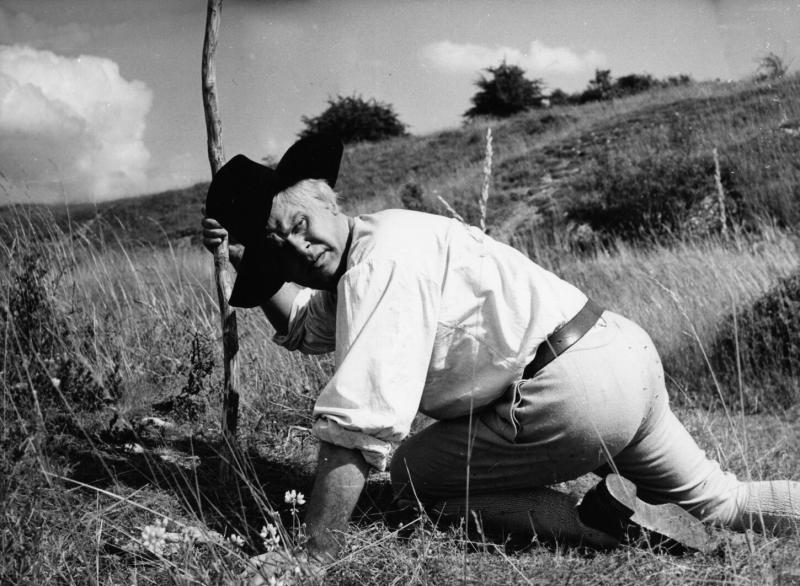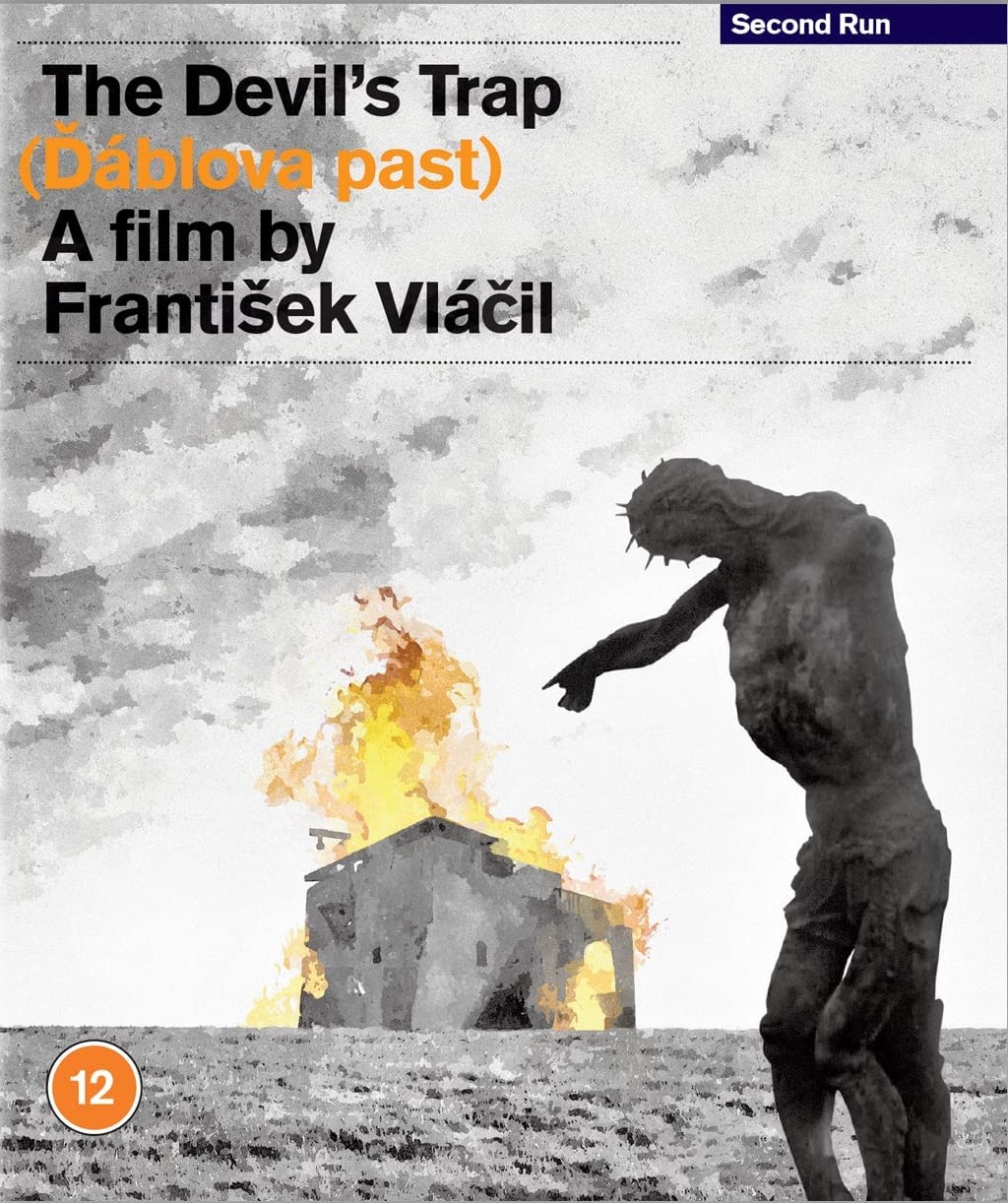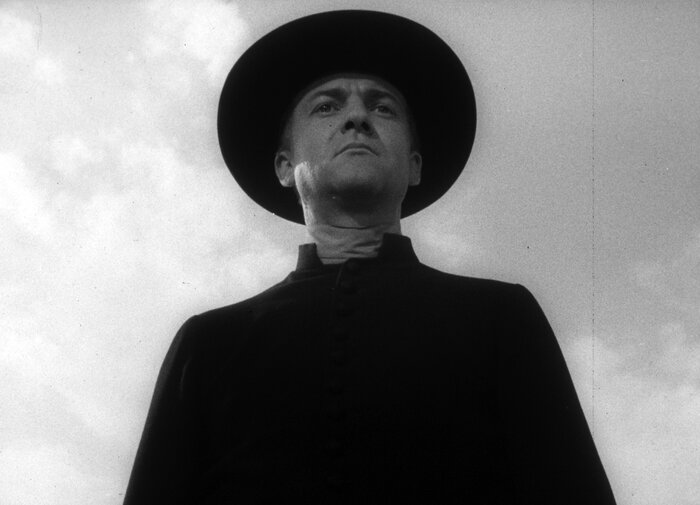Blu-ray: The Devil's Trap | reviews, news & interviews
Blu-ray: The Devil's Trap
Blu-ray: The Devil's Trap
Czech master František Vláčil’s early film of superstition and bigotry in 17th century Bohemia

Released in 1962, František Vláčil’s The Devil’s Trap (Ďáblova past) is the first in a loose trilogy of historical epics, the second instalment of which (Marketa Lazarová) is often cited as among the greatest of all Czech films.
Shorter and sparer than its successor, The Devil’s Trap is no less enthralling, Vláčil’s visual style and unusual use of sound fully evident. Based on a novel by Alfréd Technik and set in rural Bohemia during the 17th century, the film follows Probus the priest (Miroslav Machácek, pictured below), charged by Cestmír Randa’s Regent with investigating Spálený (Vítezslav Vejražka), a miller whose seemingly supernatural ability to understand the natural world leads his enemies to suspect that he’s in league with the Devil. That Spálený's family miraculously survived the burning of their mill when attacked by Swedish soldiers a century before already arouses suspicion. As do his gifts for divining fresh water in a parched, desiccated landscape and at one instance predicting when the Regent’s barn is about to fall down.
 Vláčil shrewdly hedges his bets when it comes to the film’s political slant. A bloated landowner’s religious persecution of an innocent would have pleased the Czech authorities, but it’s equally possible to see the Regent as an opportunist willing to attack anyone in order to advance his own career. Spálený and his son Jan (Vit Olmer) are serene, saintly figures, the ever-polite Probus soon realising that the best method of attack is to stir up public opinion against the pair. At times, The Devil’s Trap feels like a 1950s western, Spálený and Jan among the few honest inhabitants of a blighted, isolated township. The score, sparely deployed, is by Vláčil’s regular collaborator Zdeněk Liška, whose artificially enhanced natural sounds are as disquieting as the dissonant folk tunes heard just before the barn’s collapse.
Vláčil shrewdly hedges his bets when it comes to the film’s political slant. A bloated landowner’s religious persecution of an innocent would have pleased the Czech authorities, but it’s equally possible to see the Regent as an opportunist willing to attack anyone in order to advance his own career. Spálený and his son Jan (Vit Olmer) are serene, saintly figures, the ever-polite Probus soon realising that the best method of attack is to stir up public opinion against the pair. At times, The Devil’s Trap feels like a 1950s western, Spálený and Jan among the few honest inhabitants of a blighted, isolated township. The score, sparely deployed, is by Vláčil’s regular collaborator Zdeněk Liška, whose artificially enhanced natural sounds are as disquieting as the dissonant folk tunes heard just before the barn’s collapse.
Spálený’s abilities aren’t magical; he’s simply a man attuned to the natural world and to whom the land literally speaks. Machácek brilliantly suggests Probus’s slipperiness and duplicity; behind his polite veneer is a dangerous zealot. Vláčil’s pacing is flawless, the film’s subterranean climax both aesthetically and dramatically satisfying. The director’s fondness for striking visuals is already in evidence; the pre-credit sequence is brilliant, and look out for the repeated shot where the camera takes wing and flies towards a closed door.
 Second Run’s booklet contains an excellent essay by film historian Peter Hames, discussing the film in detail and tracing Vláčil’s career. The restored image looks and sounds sharp and clear, and the disc includes two bonus items: a 1989 tribute to the director from veteran cinematographer František Uldrich and an evocative short about Czech cinema in the early 1960s.
Second Run’s booklet contains an excellent essay by film historian Peter Hames, discussing the film in detail and tracing Vláčil’s career. The restored image looks and sounds sharp and clear, and the disc includes two bonus items: a 1989 tribute to the director from veteran cinematographer František Uldrich and an evocative short about Czech cinema in the early 1960s.
The future of Arts Journalism
You can stop theartsdesk.com closing!
We urgently need financing to survive. Our fundraising drive has thus far raised £49,000 but we need to reach £100,000 or we will be forced to close. Please contribute here: https://gofund.me/c3f6033d
And if you can forward this information to anyone who might assist, we’d be grateful.

Subscribe to theartsdesk.com
Thank you for continuing to read our work on theartsdesk.com. For unlimited access to every article in its entirety, including our archive of more than 15,000 pieces, we're asking for £5 per month or £40 per year. We feel it's a very good deal, and hope you do too.
To take a subscription now simply click here.
And if you're looking for that extra gift for a friend or family member, why not treat them to a theartsdesk.com gift subscription?
more Film
 theartsdesk Q&A: director Kelly Reichardt on 'The Mastermind' and reliving the 1970s
The independent filmmaker discusses her intimate heist movie
theartsdesk Q&A: director Kelly Reichardt on 'The Mastermind' and reliving the 1970s
The independent filmmaker discusses her intimate heist movie
 Blu-ray: Wendy and Lucy
Down-and-out in rural Oregon: Kelly Reichardt's third feature packs a huge punch
Blu-ray: Wendy and Lucy
Down-and-out in rural Oregon: Kelly Reichardt's third feature packs a huge punch
 The Mastermind review - another slim but nourishing slice of Americana from Kelly Reichardt
Josh O'Connor is perfect casting as a cocky middle-class American adrift in the 1970s
The Mastermind review - another slim but nourishing slice of Americana from Kelly Reichardt
Josh O'Connor is perfect casting as a cocky middle-class American adrift in the 1970s
 Springsteen: Deliver Me From Nowhere review - the story of the Boss who isn't boss of his own head
A brooding trip on the Bruce Springsteen highway of hard knocks
Springsteen: Deliver Me From Nowhere review - the story of the Boss who isn't boss of his own head
A brooding trip on the Bruce Springsteen highway of hard knocks
 The Perfect Neighbor, Netflix review - Florida found-footage documentary is a harrowing watch
Sundance winner chronicles a death that should have been prevented
The Perfect Neighbor, Netflix review - Florida found-footage documentary is a harrowing watch
Sundance winner chronicles a death that should have been prevented
 Blu-ray: Le Quai des Brumes
Love twinkles in the gloom of Marcel Carné’s fogbound French poetic realist classic
Blu-ray: Le Quai des Brumes
Love twinkles in the gloom of Marcel Carné’s fogbound French poetic realist classic
 Frankenstein review - the Prometheus of the charnel house
Guillermo del Toro is fitfully inspired, but often lost in long-held ambitions
Frankenstein review - the Prometheus of the charnel house
Guillermo del Toro is fitfully inspired, but often lost in long-held ambitions
 London Film Festival 2025 - a Korean masterclass in black comedy and a Camus classic effectively realised
New films from Park Chan-wook, Gianfranco Rosi, François Ozon, Ildikó Enyedi and more
London Film Festival 2025 - a Korean masterclass in black comedy and a Camus classic effectively realised
New films from Park Chan-wook, Gianfranco Rosi, François Ozon, Ildikó Enyedi and more
 After the Hunt review - muddled #MeToo provocation
Julia Roberts excels despite misfiring drama
After the Hunt review - muddled #MeToo provocation
Julia Roberts excels despite misfiring drama
 London Film Festival 2025 - Bradley Cooper channels John Bishop, the Boss goes to Nebraska, and a French pandemic
... not to mention Kristen Stewart's directing debut and a punchy prison drama
London Film Festival 2025 - Bradley Cooper channels John Bishop, the Boss goes to Nebraska, and a French pandemic
... not to mention Kristen Stewart's directing debut and a punchy prison drama
 Ballad of a Small Player review - Colin Farrell's all in as a gambler down on his luck
Conclave director Edward Berger swaps the Vatican for Asia's sin city
Ballad of a Small Player review - Colin Farrell's all in as a gambler down on his luck
Conclave director Edward Berger swaps the Vatican for Asia's sin city
 London Film Festival 2025 - from paranoia in Brazil and Iran, to light relief in New York and Tuscany
'Jay Kelly' disappoints, 'It Was Just an Accident' doesn't
London Film Festival 2025 - from paranoia in Brazil and Iran, to light relief in New York and Tuscany
'Jay Kelly' disappoints, 'It Was Just an Accident' doesn't

Add comment